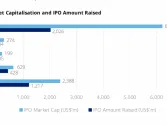
Asian fund managers prefer regional growth stocks than US and European equities
China and Korea are preferred markets with a majority bearish on India, Indonesia despite inflation being highlighted as key risk.
Asian fund managers are overwhelmingly bullish on the prospects for Asian equities, despite risks of rising inflation and stronger local currencies, favouring exposure to local markets over bets on European or U.S. stocks, according to Russell Investment’s inaugural Asian Investment Manager Outlook (IMO), which was released on Thursday. The views of 40 professional money managers across the region were taken at the end of the first quarter amid rising oil prices, turmoil in the Middle East and the Japan nuclear crisis, sparked by the magnitude 9.0 earthquake in March.
The results reveal a growth-driven bias in money manager market preference with 63% of surveyed managers saying Asia is the most attractive investment market globally. That compares to the U.S. (14%) and Europe (11%). Importantly, only 11% of surveyed managers favoured emerging markets, excluding Asia.
“Low levels of government debt, strong demographics, growing domestic demand and rapid urbanisation continue to underpin Asian economies and the regional growth story,” according to Sarah Lien, Senior Research Analyst at Russell Investments. “Drilling down to the country level, however, it is apparent that managers perceive distinct, relative differences among markets in the region.” Managers are most optimistic on China, with a total ‘bullish’ rating of 55%, compared to 12% who are ‘bearish.’ Korea is the only other country with a relatively high level of ‘bullish’ sentiment (45%) and low level of ‘bearishness’ (15%). At the other end of the scale, managers are most pessimistic on India and Indonesia, with 56% of surveyed respondents applying a bearish rating to both markets and only 9% bullish, also on both markets. In relation to the ‘non-core’ Asian markets, managers find Malaysia most attractive (43%) followed by the Philippines (26%).
Domestic sectors, including financials, are favoured
At a sector level, managers appear to be most positive on sectors which will be the biggest beneficiaries of increased domestic demand. This translates into bullish ratings for the financials (63%), consumer discretionary (59%) and consumer staples (50%) sectors. “Managers clearly feel that financial and consumer sectors are best positioned to capture structural internal growth drivers,” said Lien. “Consumer stocks, in particular, that offer solid fundamental characteristics - strong corporate profitability, robust balance sheets, high ROEs and good pricing power - are viewed as relatively more resilient given lower earnings volatility.
Cyclical sectors which rate favourably include information technology (59%) and energy (53%). Managers are overwhelmingly bearish on defensive sectors such as property REITs, utilities and telecommunications with bearish rating of 53%, 56% and 34%, respectively. According to Lien, “this supports our observation of a growth-driven theme in managers’ preference and willingness to take on higher risk in selective sectors and markets, despite headwinds like inflation and high natural resource prices.”
Inflation is a key risk with market valuations seen as “fair”
The survey also polled manager’s opinion on the key market risks in 2011. It’s no surprise that inflation topped the list with 86% of respondents indicating that this was a significant threat to Asian market growth. Already in 2011, higher agricultural and energy prices have impacted markets, especially India, where the headline inflation rate was reported in March at 8.98%.
“It is important to note that in many developing Asian countries expenditure on food often represents 30-50% of the average household budget. Governments often subsidise food. Nonetheless, rampantly rising agricultural commodity prices will hamper Asian growth rates and this concern has made its way into the survey results,” said Singapore-based Lien.
Higher inflation goes hand-in-hand with the next biggest rated risk: higher interest rates, with 57% of managers flagging the issue. With real interest rates in many parts of Asia still negative, the prospect of rising inflation may lead to more aggressive monetary tightening in the coming months, according to Russell Investments. As for market valuations, 43% of surveyed managers feel that Asian markets are fairly valued, with 30% saying the market is undervalued. Lien added, “this perspective is shared by Russell as we generally view the equity market valuation as neutral for Asia, ex-Japan. We also agree that equity markets have upside, but we’re wary of some of the more bullish forecasts. In the same way that investors became too gloomy towards the middle of last year, there is a risk that positive economic news is being over-extrapolated.” At the current neutral valuation, managers tend to view any future market correction as healthy, providing an opportunity to look for bargains, according to the report.
“Valuations remain reasonable and corporate profits have generally been strong, supportive for those investors who are looking to enter Asian markets,” said Lien.



















 Advertise
Advertise







